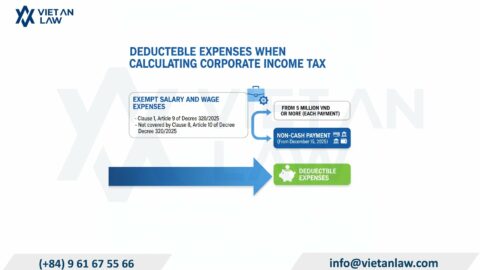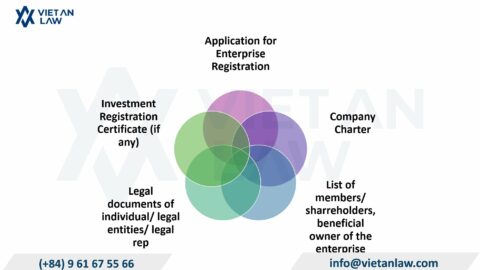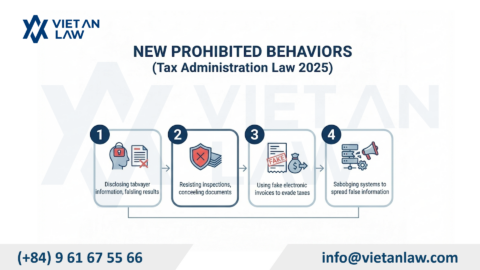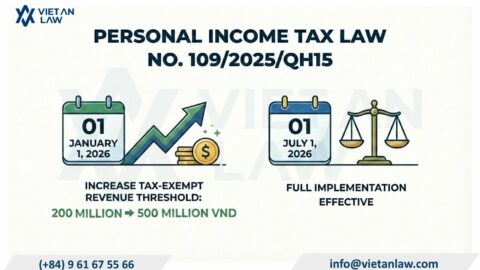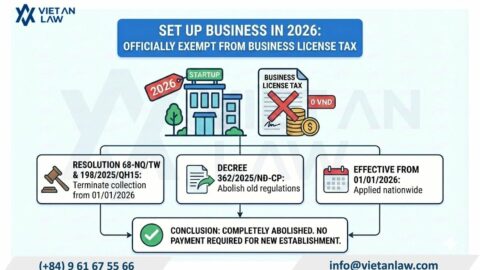Depreciation of fixed assets is an important operation in accounting, reflecting the wear and tear value of assets over time and recorded in the production and business costs of enterprises. However, not all fixed assets are allowed to depreciate on reasonable expenses when determining taxable income. In order to ensure transparency, correctness and compliance with the law, the Ministry of Finance has issued specific regulations on cases in which fixed assets are not eligible for depreciation. Understanding and correctly applying the cases in which depreciation is not allowed not only helps businesses avoid risks when finalizing taxes but also ensures the accuracy of financial statements. In this article, Viet An Tax Agent will work with you to learn in detail 09 specific cases in which businesses are not allowed to depreciate fixed assets, according to the guidance of Circular 45/2013/TT-BTC, Circular 30/2025/TT-BTC and related documents.
Table of contents
Fixed asset depreciation expense is an expense recorded by an enterprise to reflect the depreciation of the value of fixed assets during use. Instead of including the entire value of the asset in expenses in a period, the enterprise will gradually allocate that value according to the actual use time of the asset, in accordance with the principle of appropriateness between costs and revenue in accounting.
Depreciation expense not only helps to accurately reflect business results but also serves as a basis for determining deductible expenses when calculating corporate income tax. However, only fixed assets that meet the conditions prescribed by law (as prescribed in Circular 45/2013/TT-BTC) will be accepted as reasonable expenses. In the event that the property is ineligible or falls under non-depreciable circumstances, this expense will not be included in the deductible expense when determining taxable income.
According to the provisions of Circular 45/2013/TT-BTC, only fixed assets directly serving production and business activities are eligible for reasonable and valid depreciation, such as:
In case the enterprise has fixed assets for personal purposes, leased without generating revenue, or used for activities outside the main business scope (such as reception, internal welfare, etc.), the depreciation deducted for these assets shall not be included in reasonable expenses when declaring tax. Therefore, businesses need to clearly classify the purpose of use of each fixed asset and criticize depreciation for assets that meet the prescribed conditions, in order to avoid being excluded from expenses in the tax finalization process.
Fixed assets that do not have sufficient legal documents proving the legal ownership of the enterprise will not be eligible for depreciation and will not be included in deductible expenses when determining income subject to corporate income tax. According to the provisions of Circular 45/2013/TT-BTC, one of the important conditions for an asset to be recognized as a valid fixed asset is that the enterprise must have the lawful ownership or right to use that asset, which is shown through documents such as invoices, contracts, etc handover record, certificate of ownership, or other equivalent documents.
The lack of documents proving ownership makes the asset not meet the standard for recording as a fixed asset according to accounting regulations, which means that all depreciation deducted for this asset is not included in the valid expenses when calculating tax. Therefore, in order to ensure legality and be accepted when finalizing taxes, enterprises need to fully archive legal documents of fixed assets before depreciating and accounting expenses.
Fixed assets that are not managed, monitored and accounted for in accounting books by the enterprise in accordance with the current accounting regime and regulations on management of fixed assets will not be eligible for depreciation and will not be included in deductible expenses when determining income subject to corporate income tax. According to the provisions of Circular 45/2013/TT-BTC and related documents, the recording of fixed assets in accounting books is a mandatory condition to establish valid value and monitor the process of use and depreciation throughout the life of the asset.
If the enterprise does not fully record the increase, track or account for the fixed asset as prescribed — even if the asset is eligible for value and useful life — the depreciation of this asset is still not accepted by the tax authority as a reasonable expense. Therefore, in order to ensure tax benefits and transparency in asset management, enterprises need to fully record fixed assets in accounting books, manage in detail for each asset, and properly reflect arising operations related to depreciation.
Depreciation expenses in excess of current regulations of the Ministry of Finance shall not be included in deductible expenses when determining taxable income. Enterprises must notify the applicable depreciation method (e.g., straight line method) to the tax authority before implementation.
Every year, enterprises deduct depreciation in accordance with regulations, even when applying accelerated depreciation. In case the enterprise operates efficiently and satisfies the conditions, it is allowed to deduct depreciation quickly, but not more than 2 times the depreciation rate according to the straight-line method and must ensure profit.
Assets that do not qualify as fixed assets but are eligible for capital contribution, transfer, separation, merger, etc. and if there is a re-evaluation as prescribed, the re-evaluation value shall be included in the cost or gradually allocated.
For do-it-yourself fixed assets, the historical cost for depreciation is the total cost of production to create that asset.
For tools, tools, rotating packaging… ineligible for recognition as fixed assets, the purchase cost will be gradually allocated to business expenses, not exceeding 3 years.
Fixed assets that have been fully depreciated in value as prescribed but the enterprise continues to use them are not allowed to be further depreciated. The continued recognition of depreciation expenses for these assets is not in accordance with accounting regulations and will not be included in deductible expenses when determining income subject to corporate income tax. However, enterprises must continue to monitor and manage these assets on accounting books to serve the inventory and control of assets and ensure transparency in financial management.
The depreciation corresponding to the historical cost exceeding VND 1.6 billion for each passenger car with 9 seats or less will not be included in the deductible expenses, except for the following cases:
In case an enterprise transfers or liquidates a passenger car with 9 seats or less, the residual value of the vehicle shall be calculated as the actual historical cost of purchase minus the accumulated depreciation amount according to the regime of management, use and depreciation of fixed assets up to the time of transfer or liquidation.
The depreciation for fixed assets that are civil aircraft or yachts will not be included in the deductible expenses if they do not serve the business of transporting goods, passengers, tourism or hotels. Specifically, for enterprises that register and account for depreciation of civil aircraft and yachts but do not record the business line of cargo transportation, passenger transportation, tourism business or hotel in the Business Registration Certificate or Enterprise Registration Certificate, this depreciation will not be accepted.
Depreciation of works on land shall only be included in the deductible expenses corresponding to the area used for production and business. The area not used for this activity will not be depreciated.
In order to calculate depreciation expenses, enterprises must ensure: have a certificate of land use rights or a legal land lease or borrowing contract; having invoices, construction contracts and settlement of works bearing the name of the enterprise; works are managed and accounted in accordance with regulations on fixed assets.
If the fixed assets under the ownership of the enterprise that are being used for production and business must be suspended, depreciation expenses during this period shall only be included in the deductible expenses if the following conditions are met: the temporary suspension due to seasonal production for less than 9 months or due to repairs, relocation, maintenance for less than 12 months, and then the property is continued to be used for production.
Enterprises must keep sufficient records proving the reason for suspension to provide when requested by the tax authority.
Existing tangible fixed assets that are temporarily unusable and have not yet participated in production and business activities at enterprises with 100% of the charter capital of enterprises in which the State holds 100% of the charter capital under the Scheme on handling of shortcomings, weaknesses of a number of projects and enterprises that are behind schedule and inefficient in the Industry and Trade sector according to the Prime Minister’s Decision No. 1468/QD-TTg dated September 29, 2017: Enterprises are allowed to actively postpone or postpone depreciation during the unused period and ensure the principle of depreciation time of fixed assets according to the depreciation time frame as prescribed in this Circular
When an enterprise buys tangible fixed assets such as houses and architectural objects associated with long-term land use rights, the value of land use rights must be separated and recorded as intangible fixed assets. The historical cost of tangible assets includes the actual purchase price plus direct costs related to putting the assets into use.
The value of land use rights is determined according to the price stated in the real estate purchase contract, in accordance with the market price but not lower than the land price list prescribed by the People’s Committee of the province or city at the time of purchase.
In case the value of land use rights cannot be separated, the enterprise will determine the value of land use rights according to the price list issued by the People’s Committee of the province or city at the time of asset purchase.
If you have any difficulties or questions related to 09 cases that are not eligible for depreciation, please contact Viet An Tax Agent for the most specific advice.
